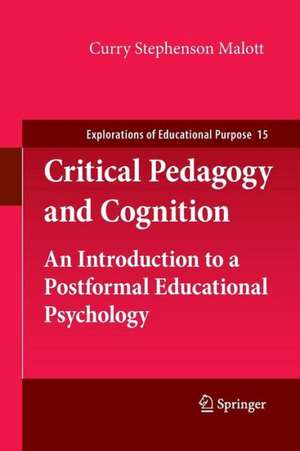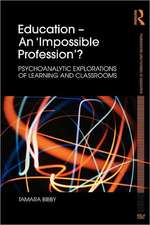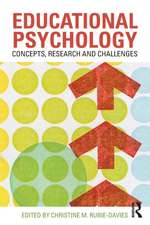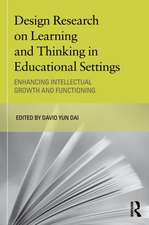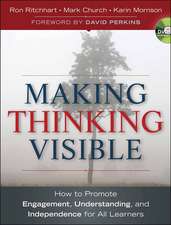Critical Pedagogy and Cognition: An Introduction to a Postformal Educational Psychology: Explorations of Educational Purpose, cartea 15
Autor Curry Stephenson Malotten Limba Engleză Paperback – 15 oct 2014
The text’s uniqueness stems from its bold attempt to connect the postformal critical constructivist/pedagogy work of Joe Kincheloe and others to Western science through a shared, although previously misunderstood, critique and rejection of crude forms of social control, which the psychologists call behaviorism and Western scientists identify as mechanical philosophy. This book therefore argues that critical pedagogy— which includes, among others, anarchist, Marxist, feminist, Indigenous (globally conceived), Afro-Caribbean/American, and postmodern traditions—and critical/constructivist educational psychology have much to gain by engaging previously rejected work in critical solidarity, that is, without compromising one’s values or democratic commitments. The goal of this book is therefore to contribute to this vision of developing a more transgressive and transformational educational psychology.
| Toate formatele și edițiile | Preț | Express |
|---|---|---|
| Paperback (1) | 636.12 lei 6-8 săpt. | |
| SPRINGER NETHERLANDS – 15 oct 2014 | 636.12 lei 6-8 săpt. | |
| Hardback (1) | 642.51 lei 6-8 săpt. | |
| SPRINGER NETHERLANDS – 23 feb 2011 | 642.51 lei 6-8 săpt. |
Din seria Explorations of Educational Purpose
- 15%
 Preț: 639.25 lei
Preț: 639.25 lei - 15%
 Preț: 640.37 lei
Preț: 640.37 lei - 15%
 Preț: 634.18 lei
Preț: 634.18 lei - 15%
 Preț: 641.71 lei
Preț: 641.71 lei - 15%
 Preț: 635.31 lei
Preț: 635.31 lei - 15%
 Preț: 639.41 lei
Preț: 639.41 lei - 15%
 Preț: 632.22 lei
Preț: 632.22 lei - 15%
 Preț: 642.36 lei
Preț: 642.36 lei - 15%
 Preț: 637.28 lei
Preț: 637.28 lei - 15%
 Preț: 637.78 lei
Preț: 637.78 lei - 15%
 Preț: 646.62 lei
Preț: 646.62 lei - 15%
 Preț: 636.94 lei
Preț: 636.94 lei - 15%
 Preț: 642.36 lei
Preț: 642.36 lei - 15%
 Preț: 641.53 lei
Preț: 641.53 lei - 20%
 Preț: 561.98 lei
Preț: 561.98 lei - 15%
 Preț: 636.80 lei
Preț: 636.80 lei - 15%
 Preț: 637.93 lei
Preț: 637.93 lei - 15%
 Preț: 638.76 lei
Preț: 638.76 lei - 15%
 Preț: 644.30 lei
Preț: 644.30 lei - 15%
 Preț: 649.06 lei
Preț: 649.06 lei -
 Preț: 390.25 lei
Preț: 390.25 lei - 15%
 Preț: 644.30 lei
Preț: 644.30 lei - 15%
 Preț: 645.47 lei
Preț: 645.47 lei - 15%
 Preț: 644.63 lei
Preț: 644.63 lei - 15%
 Preț: 639.25 lei
Preț: 639.25 lei
Preț: 636.12 lei
Preț vechi: 748.38 lei
-15% Nou
Puncte Express: 954
Preț estimativ în valută:
121.72€ • 132.63$ • 102.57£
121.72€ • 132.63$ • 102.57£
Carte tipărită la comandă
Livrare economică 23 aprilie-07 mai
Preluare comenzi: 021 569.72.76
Specificații
ISBN-13: 9789400735316
ISBN-10: 9400735316
Pagini: 208
Ilustrații: XI, 196 p.
Dimensiuni: 155 x 235 x 11 mm
Greutate: 0.3 kg
Ediția:2011
Editura: SPRINGER NETHERLANDS
Colecția Springer
Seria Explorations of Educational Purpose
Locul publicării:Dordrecht, Netherlands
ISBN-10: 9400735316
Pagini: 208
Ilustrații: XI, 196 p.
Dimensiuni: 155 x 235 x 11 mm
Greutate: 0.3 kg
Ediția:2011
Editura: SPRINGER NETHERLANDS
Colecția Springer
Seria Explorations of Educational Purpose
Locul publicării:Dordrecht, Netherlands
Public țintă
ResearchCuprins
Introduction Joe L. Kincheloe and Curry Stephenson MalottPSYCHOLOGICAL AND CRITICAL FOUNDATIONS 1.Paradigms and Knowledge: Understanding the Field of Cognitive Studies and Educational Psychology2.The Social Construction of the Dominant Psychological Paradigm: Columbus, Slavery, and the Discourses of Domination3.The Social Construction of Educational Psychology (continued): Implications for Teacher EducationPOSTFORMAL PSYCHOLOGY AND CRITICAL PEDAGOGY4.What is Postformal Psychology? Toward a Theory of Critical Complexity5.What is Critical Pedagogy? The Historical and Philosophical Roots of Criticality6.Academic Critical Pedagogy: Critical Pedagogy in the Contemporary ContextCRITICAL THEORY AND REVOLUTIONARY PSYCHOLOGY7.Postformal Psychology: Widening the Circle of Criticality
Textul de pe ultima copertă
This book simultaneously contributes to the fields of critical pedagogy and educational psychology in new and innovative ways by demonstrating how critical pedagogy, postformal psychology, and Enlightenment science, seemingly separate and distinct disciplines, are actually part of the same larger, contextualized, complex whole from the inner most developmentally-fixed biological context of human faculties to the perpetually shifting, socially and politically constructed context of individual schema and human civilization.
The text’s uniqueness stems from its bold attempt to connect the postformal critical constructivist/pedagogy work of Joe Kincheloe and others to Western science through a shared, although previously misunderstood, critique and rejection of crude forms of social control, which the psychologists call behaviorism and Western scientists identify as mechanical philosophy. This book therefore argues that critical pedagogy— which includes, among others, anarchist, Marxist, feminist, Indigenous (globally conceived), Afro-Caribbean/American, and postmodern traditions—and critical/constructivist educational psychology have much to gain by engaging previously rejected work in critical solidarity, that is, without compromising one’s values or democratic commitments. The goal of this book is therefore to contribute to this vision of developing a more transgressive and transformational educational psychology.
The text’s uniqueness stems from its bold attempt to connect the postformal critical constructivist/pedagogy work of Joe Kincheloe and others to Western science through a shared, although previously misunderstood, critique and rejection of crude forms of social control, which the psychologists call behaviorism and Western scientists identify as mechanical philosophy. This book therefore argues that critical pedagogy— which includes, among others, anarchist, Marxist, feminist, Indigenous (globally conceived), Afro-Caribbean/American, and postmodern traditions—and critical/constructivist educational psychology have much to gain by engaging previously rejected work in critical solidarity, that is, without compromising one’s values or democratic commitments. The goal of this book is therefore to contribute to this vision of developing a more transgressive and transformational educational psychology.
Caracteristici
Introduces readers to a complex set of ideas around issues of critical pedagogy, cognition, and educational psychology Lays out a new paradigmatic approach to the study of cognition and the implications of this perspective for educational psychology Presents complex ideas in an accessible format
